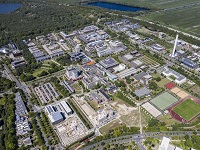Virtueller Autoren-Workshop 08.-09.07.2021Die Ausschreibung als PDF
The foreign policy of Africa’s Great Lakes Region: Ideas, interconnections, and instruments
- Virtual Author Workshop 8 and 9 July 2021, University of Bremen, Germany, organized by Dr. Jude Kagoro jude.kagoro@uni-bremen.de and Julian Friesinger julian.friesinger@uni-bremen.de
Yoweri Museveni has just been re-elected for another five-year term as Ugandan President. Ruling the East African nation since 1986, Museveni is now set to rule Uganda for four decades and presently is the 3rd longest serving president in Africa only behind Equatorial Guinea’s Teodoro Obiang Nguema Mbasogo and Cameroon’s Paul Biya. Across Uganda’s border to the South, Paul Kagame, Museveni’s former comrade-in-arms, has also established an environment that allows for the long-term rule of the rebel-turned-president in Rwanda. Kagame has been president for 20 years and in a de facto sense 26 years, since his Rwandan Patriotic Front (RPF) took power in 1994. Rwanda in many ways resembles Museveni’s Uganda. Crucial for consolidating Museveni’s long-term rule has been the militarization of politics and society which arguably also applies to the latter case of Rwanda.
The aspect of militarization has gained traction beyond the field of political sociology and the study of regime stability and found its way into foreign policy analysis. One important legacy of former rebel leaders and their movements has been the institutionalization of militarization and securitization at the regional level and the relations of these states, that is particularly evident in the case of the Great Lakes region, visible for example in the transformation of regional bodies such as the Intergovernmental Authority of Development (IGAD). This makes militarization a central aspect of the foreign policies of the countries in the Great Lakes region. The violent past and the resulting militarization is therefore bound to remain an influential determinant of the regional relations of East African states.
However, militarization or in this case military intervention has largely remained the last resort and is only one tool of foreign policy that governments dispose of. Diplomacy as the classical tool, but also trade have always played crucial roles in the foreign policy of states, also of East African nations. This is all the more evident when one also considers Kenya, Tanzania, and Burundi. The traditional instrument of diplomacy and alliance building as well as trade have played a crucial role here. Uganda’s elite has always fostered a pan-Africanist discourse and due to Museveni’s socialization in Nyerere’s Tanzania also retained close ties to Tanzanian and Kenyan elites. Economic integration has remained a central concern of the East African region since the rekindling of the once collapsed East African Community and is still a priority on the agenda of these states. Furthermore, the foreign policy of states has always been influenced by their domestic political sphere, the elites’ instincts of self-preservation and continued rule, but also by perceptions of a country’s population. China also plays an increasingly important role in the international system and therefore also has an impact on the foreign policy of the Great Lakes Region of Africa.
We take the renewed interest in the foreign policy of the Great Lakes Region as a starting point to inquire more broadly about the current state of the international relations of the area and seek to engage different scholars in that debate during an online workshop on 8 and 9 July 2021 that will be held within the framework of our research project “Figurations of Internationalized Rule in Africa” which is funded by Deutsche Forschungsgemeinschaft (German Research Foundation).
Though not cast in stone and adjustments are expected, we intend to orient the workshop around three major themes: the micro-level of foreign policy, militarized foreign policy and global politics:
- The micro-level: How are the elite segments within bureaucracies and the foreign policy apparatus constituted, how and where were they socialized, and what image of foreign policy do they pursue? Do we see corresponding images among elites across nations or are these at odds with each other?
- The domestic/regional level: What role do militarized solutions play alongside the other instruments of foreign policy? What local perceptions and historical narratives drive the foreign policies of states in the Great Lakes region? What preference for instruments can we see in the wider region of East Africa?
- Interconnectedness between domestic and foreign policy: To what extent do authoritarian governments have to react to domestic policy pressures and how does the domestic sphere influence foreign policy?
- The interaction of the international system and foreign policy of the states of the Great Lakes region: Do we see an impact of the emerging multipolar international system on the foreign or domestic policy of the countries of the Great Lakes region or the area as a whole? How do African governments react to changing international relations?
We specifically invite contributions that either compare different states in the Great Lakes Region or look at the connection between the domestic sphere of politics and the foreign policy of countries (in-depth country study). Moreover, we are also interested in manuscripts that look at how countries in the region insert themselves into the international world order.
Please send a short abstract of no more than 500 words until 31 March 2021. Contributions for the workshop are chosen on a competitive basis.
We intend to discuss manuscripts related to the above questions during a two-day online workshop on 8 and 9 July 2021. We plan to publish the papers in an edited volume with an internationally renowned publishing house.
Contact
For any further questions, please contact us via:
Dr. Jude Kagoro jude.kagoro@uni-bremen.de
Julian Friesinger julian.friesinger@uni-bremen.de
 Luftbild Uni-Campus. (c) Detmar Schmoll/Universität Bremen
Luftbild Uni-Campus. (c) Detmar Schmoll/Universität Bremen

 Free-Photo from Pixabay" title="
Free-Photo from Pixabay" title="